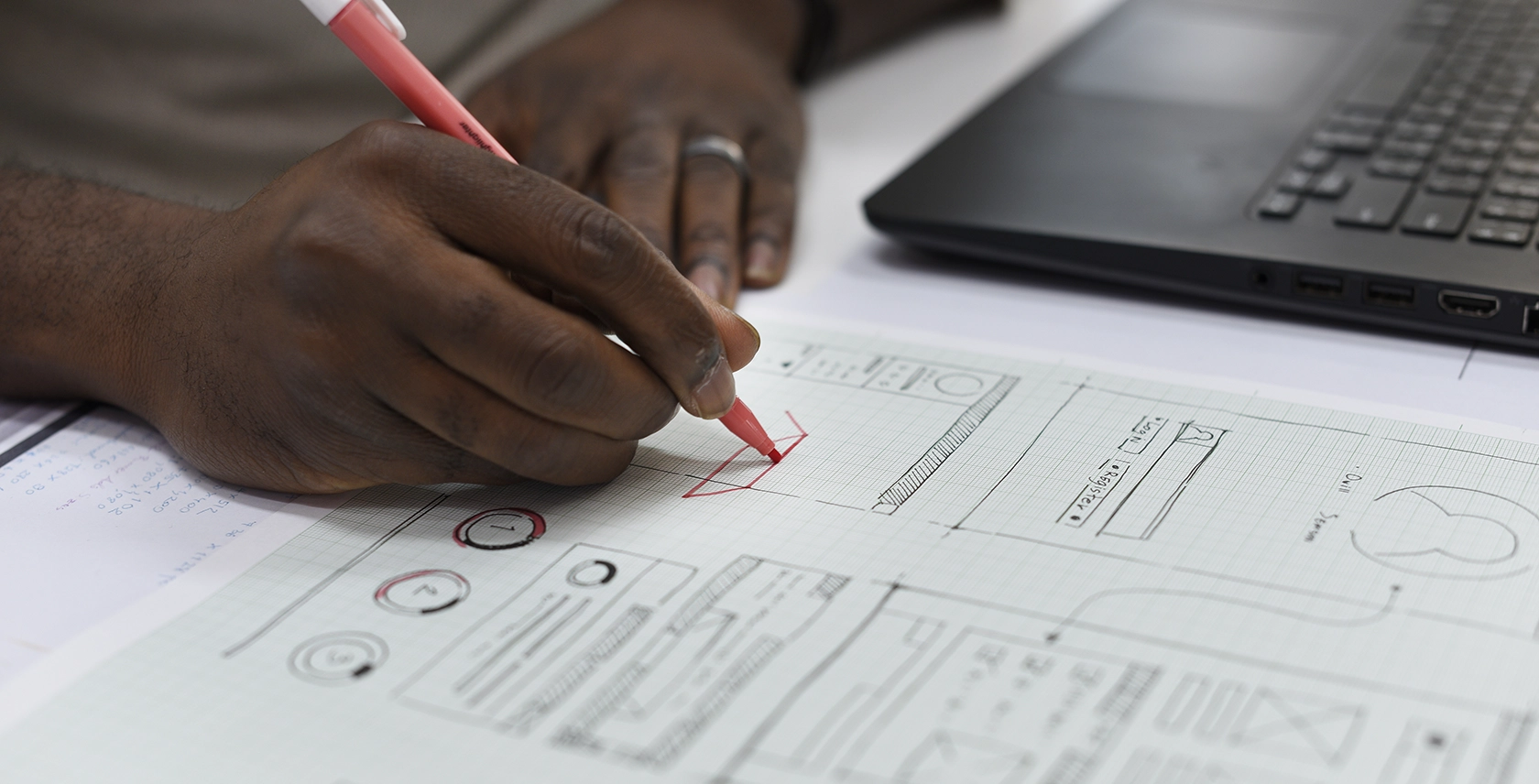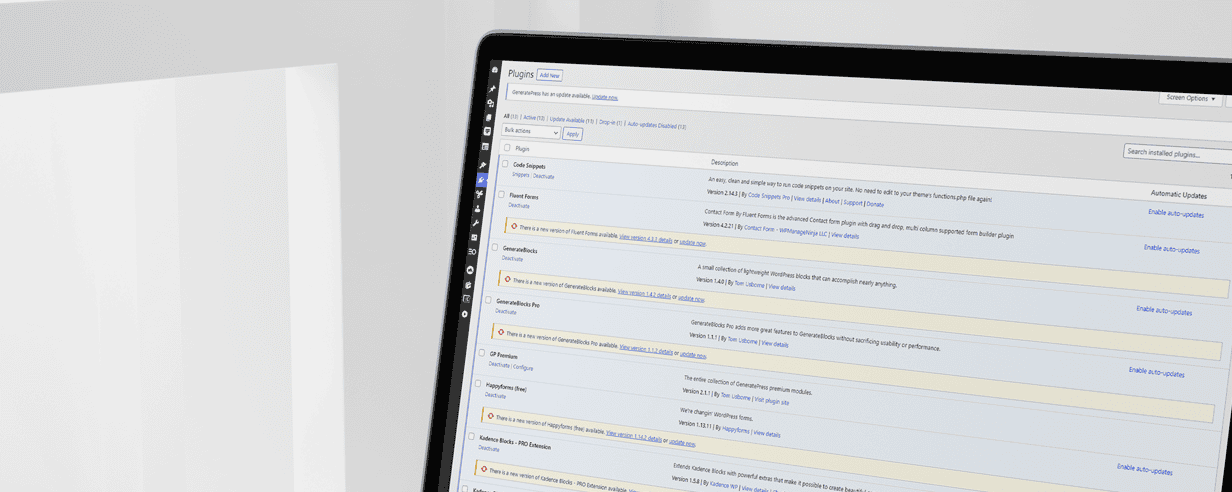When we use the phrases “web design” or “website design” generically, we’re using umbrella terms that include a few different elements that go into the production of a website. This includes: digital strategy, content writing, website design, website development, performance optimization, validation, and ongoing maintenance. To produce a website that helps your business grow, you actually need a combination of all of these things contributing towards your ultimate goal.
The price, scope, and timeline of your website project can vary widely depending on each of these factors, and we’re going to take a look at each element’s role and influence over your project’s success in this article.
Each of these practices are dependent on the one that precedes it, which means you need to follow a linear process— starting with a strategy for your website.
What is the process of designing a website?
Website Strategy
Your website strategy has an overarching effect on every aspect of your online presence, but before we can move forward to those things we must first understand some fundamental things.
This includes answering questions like: Who is your website for? Why will people visit? What do you want them to do? How does a website fit into your business model? How does it fit into your marketing campaigns? What are your competitors doing online? What do you want your website to actually do?
These, along with many other questions, will ultimately determine the overall strategy for your website.
While many do-it-yourself website builders have become popular, they are missing the most important aspect in building a successful online presence— the strategy behind it. Without the strategy in place, you could end up with a beautiful design that “does” very little for your business.
Having a beautiful website is one thing, having a beautiful website that helps to grow your business is something else entirely. How will your website add value to your company? What problems will your website solve for you? What repetitive tasks can it streamline for you?
An essential part of figuring out the strategy behind your website is deciding where it’s going to fit into your overall digital strategy. Is it going to be a simple landing page to just have something up online, or is it going to be a complex eCommerce set up with online marketing campaigns driving traffic to your website?
To get the most out of your investment, you’ll want to set clear, measurable goals that you want to achieve from your website. Take a look at setting SMART (smart, measurable, achievable, relevant, and timely) goals, checking in on your progress every few weeks, and evolving your online strategy with your business.
Website Content
Your website content includes the words, images, graphics, video, and any other media that will be on your website.
It’s important that the content on your website is in alignment with your strategy, but there are other factors to consider as well— such as search engine optimization, user experience, and being able to persuade visitors to take your desired actions.
Ultimately it is the content on your website that will differentiate you from your competitors and determine whether or not a visitor engages and takes action, whether that’s making a purchase or giving you a call.
Many business owners are tempted to write their own website copy, use photos taken from their cell phone (or externally sourced images), or mix-matched graphics from projects past— but it’s important to consider if you have the skills, knowledge, and experience in order to do it effectively yourself.
Your website content represents your entire company online— do you want all the hard work you’ve put into establishing your business being undermined by spelling mistakes and blurry images? No! Simple mistakes can be big red flags for your site’s visitors. Consider what your online content says about you. If needed, hire professionals to help you.
Website Design
“Design” is the most common catch-all phrase for having a website built, but when it comes to building a website, the primary focus of web design is to create the layout and visual elements of how your website will look. Industry professionals sometimes reference the visual aspects of a website as “User Interface” or “UI”.
Another factor to consider in website design is the “User Experience” or “UX”. UX is primarily focused on usability, accessibility, and how customers feel when using your site.
Both UX and UI need to be considered when designing a website, as many of their functions have a strong overlap.
Good UX and UI can be the difference between turning a casual website visitor into a loyal customer. It can be the deciding factor for someone who finds you on Google staying and browsing through what you offer and hitting that back button and clicking on someone else’s website instead.
Website Development
Website development is taking the design concepts and putting them into functional use within a web browser. It’s important that a site is well-coded, structured properly, and performs at a peak level in order to be successful.
During development, the developer must take into account your strategy, content, and design in order to produce a usable website that will display and function properly across a multitude of devices and screen sizes.
Website developers are responsible for creating the actual website your visitors browse on. Website development comes in many forms – you’ll find people that code websites from scratch (admittedly pretty rare now due to the time and effort this takes) and developers who use content management systems (CMS) like WordPress, Shopify, Joomla, Magento and hundreds of others. With a rise in DIY website builders, there are companies who have limited traditional coding skills but create websites on things like Wix and Squarespace. What option you go for depends on what your website needs functionality-wise, your budget, and your project’s timeline.
Website Performance
What good is a website that no one can access? The performance of your website is critical.
When it comes to website hosting, there are a wide variety of options available, but any option you choose will have strengths and weaknesses. It’s important to take into consideration your strategy, content, design, and development stack to ensure you have the proper infrastructure in place.
Additionally you’ll want to make sure you have the proper security and backup schedule in place to ensure your website continues to perform without interruption.
The requirements needed for this element of your website will depend heavily on what choices you went with earlier on in the web design process.
Website Validation
All the decisions you made leading up to the launch of your website have been based on research and experience— but until you start getting live traffic to your website you won’t know how these things play out in the “real world”.
Validation is an important step to measure your website’s effectiveness and collect data to figure out what’s working (and what isn’t). You can then use these analytics to make strategic decisions to make adjustments to your strategy, content, design, development, and performance based on real user data.
Continuous iteration is an important factor in owning an effective website because people, technology, and your business constantly evolves over time. In order to stay relevant and continue to operate a successful website, you’ll want to continue to invest in your online presence for the life of your website.
Ongoing Website Maintenance
Just like anything in life, if you let your website sit idle it can start to deteriorate— something you certainly don’t want to happen to something you just invested so much time and money into.
WordPress maintenance is especially important as much of the software that makes up your website is built by 3rd party vendors. Over time there are updates & changes to this software (for functionality and security) that needs to be updated.
Without proper maintenance, your website can become vulnerable to hacks, security breaches, or simply become unusable.
Wrapping Up
A website is more than just one thing— as we discussed in this article it’s actually many things all working in coordination to get you to your ultimate goal.
Working with a web developer that understands all of these factors and can help you excel in each element is critical. The most common mistake seen today is having everything in place except for the strategy.
It’s really no surprise — with the rise of DIY website builders (like Wix, Weebly, & Squarespace) just about anyone can have a functioning site built with a beautiful template. Unfortunately, without any thought or strategy, sites like this rarely perform well and their owners don’t get the return on their investment they were expecting.




